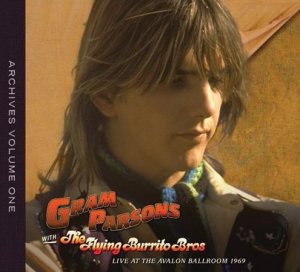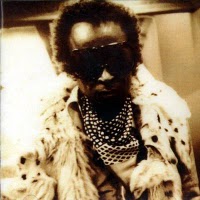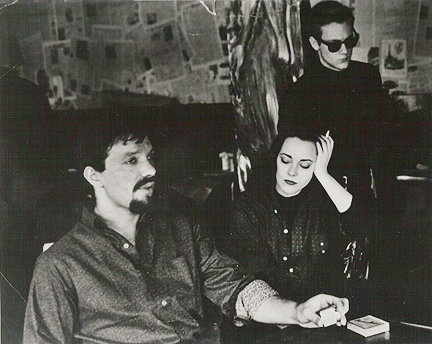
In September of 1973 a trust-fund rich kid checked into the Joshua Tree Inn at San Bardino County, California among the spooky Death Valley desert with its iconic jagged rocks host to a thousand classic Westerns. He would never leave.
Oh he was troubled this golden boy from Tennessee. His mother Avis’d been a manipulative drunk, heiress to a fortune based on oranges and lemons. His father, ol’ Coondog Connor, came from an even wilder branch of the Southern tree. A charming sort, Coondog, with music in his soul but it was never a happy home. He worked for his wife’s family the Snively Clan at some desk and finally blew his brains out when he couldn’t take it anymore. So here’s the kid and his young sister trapped in the weary gilded cage of loveless wealth. But the kid liked Elvis. Worshiped Elvis. He’d snuck backstage and got his autograph and he was gonna do the same thing sometime. So his mother sends him to military school. I guess she thought he was trouble. Why who knows. Everyone who ever knew him commented on his impeccable manners – a true Southern Gentleman.
About five minutes after they planted Coondog, Avis married a slick salesman with a greasy smile and a reptile’s heart. He spent her money, cheated on her all over town, didn’t bother to cover it up. Soon enough the bitter old gal drank herself to death and the kid and the sister had no-one except each other. It was pretty obvious that Robert Parsons was a snake but he’d made the right moves, adopted the kids and now there was no getting rid of him. Later the kid got married and he had Parsons preside over the ceremony. After all he hadn’t come to expect much by way of love and his step-dad was all he had left.
And money. Money helps. He made it to Harvard where his interests in music deepened and hearkened back into country and bluegrass. He formed bands, convinced stardom was his destiny. Another bit of unloved flotsam from Flyover, USA looking for what his parents never gave him in the adoration of a million anonymous fans. He had money, he had talent too but the money queered it. He couldn’t deliver on time, couldn’t summon the goods at will.
His inheritance was a fortune in gold and a powerful thirst for oblivion. He was a boozer just like his parents and their’s before them. And this was the ’60s, so naturally he tripped the light fantastic as well. His first real band, the International Submarine Legend, featured in the Roger Corman LSD fantasia The Trip. With a name like that how could they not appear. The kid had half-arrived, already a semi-legend. He’d found himself out in California where he played the Whiskey-a-Go-Go and sampled the pot and acid West Coast flavors of Hashbury and the Freak Kingdom. After the ISB fell apart he patched up the freshly busted Byrds and had them go to Nashville to record The Sweetheart of the Rodeo. Almost no-one bought the album, it was the lowest selling Byrds disc yet. But somehow it changed the direction of rock music away from the Blues and toward bluegrass. People who met him often say they didn’t like country music beforehand, that they didn’t get it. He helped ’em get it. Even those who’ve subsequently written him off as a rich-kid fuck-up give him that.
Sometime around then he fell into the Mephistophelian circle around the Rolling Stones. Became tight with Keith. They played, they partied. And he took Keith and his lady Anita Pallenberg to his favourite place Joshua Tree, California to climb the mountains, drop acid, take in the sunset and wait for the UFOs that were known to appear around there.

This was the Stones’ great era: Beggar’s Banquet, Let It Bleed, Sticky Fingers: their high point. The country inflections and the ascendance of that style of music in their albums has been attributed to Richards’ friendship with this young southern gentleman. The gentleman’s demise has frequently been attributed to the Stones. After this hat trick listed above the Stones repaired to a mansion overlooking the sea where they would record the record that for some was their greatest and for others the start of their long slide down – Exile On Main Street.
The place was awash with sycophants and crocodiles. Everyone except maybe Charlie Watts was high and all the time. Richards was the conductor and impresario of this Fellini-esque circus. Some guy delivered a large bag of pink heroin on a weekly basis. Wires snaked thru the house from the portable studio into the basement where the various players would spend their nights pushing out this tribute to American music thru the Eurotrash haze. Richards spent the afternoons with the kid, writing country songs and snorting coke and then he’d leave him there and apply what he’d learned somehow in the basement. And the kid? He was trouble.
Trouble? This was a place where knives got thrown around on a regular basis; garbage, bottles and burnt spoons everywhere. Everyone was throttling it. But still someone in the Stones kicked the kid and his too-young, constantly whining wife out. He was trouble! Strange considering the lizards and moochers that stayed. But I guess they were concerned about him attracting inviting inconvenient intervention by the authorities by dropping dead.. He was dropping off all the time, out of it. So they gave him the boot and when he flew back to England and asked for the key to Richards’ London flat. The guy who held it said he’d lost it. Someone had phoned from the mansion in France and ordered him to lie.

Still the kid picks up, licks his wounds, takes the cure and back to California. He got on with it, recording his solo stuff, hanging out with Emmylou Harris. But the damage was apparent. This fresh looking boy was now a seedy, fat, ruined drunk. He’d go back to Joshua Tree to clear the webs from his soul but what good did it do? Every bar in town knew his face. So here he was, September ’73, checking in one last time. On phenobarbital to treat the after-affects of a motorbike accident three years before. It didn’t stop him drinking.
Different accounts argue the point but the story says that a young girl whose boyfriend or something pinched morphine supplies from the local Marines base came over late the next night and shot the kid up – twice. His request. He was already loaded on the barbituates and the booze and he wanted more. The girl gave him his second helping and ran. She saw the blue in his face and knew what it meant. The kid’s friends in typical style tried all the home cures before it snapped that they need medical assistance. Sometime about midnight coming into September 19th an ambulance picked up a near-corpse. He didn’t make it to the hospital.
Outside New Orleans there’s a simple grave you can visit. For years there was a simple wooden marker with the name next to the word ‘singer’. No-one gave a shit. The Snivelys didn’t bother with the funeral. But later on the kid sister came around and fixed it up a little with a decent headstone that now reads: Gram Parsons: God’s Own Singer.






